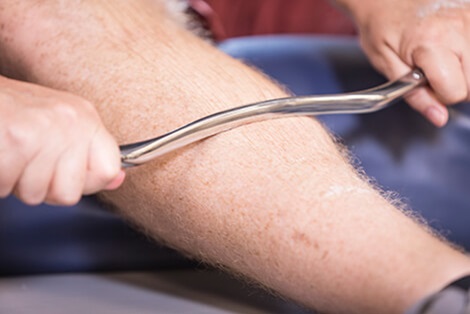Instrument-Assisted Soft Tissue Mobilization (IASTM)
Effective treatment for muscle, ligament and tendon injuries
Instrument-assisted soft tissue mobilization (IASTM) is a technique we often use in physical therapy. IASTM works like a standard massage, but specialized instruments are used in place of a physical therapist’s hands. These instruments allow more direct treatment of the soft tissues involved with movement. The tissues include:- Muscles
- Fascia, connective tissue that surrounds and separates muscles
- Ligaments, tissue that connects bones to other bones
- Tendons, tissue that connects muscles to bones
IASTM can involve broad or targeted treatments. The former would be used for large muscle groups, such as an injured back, the latter for an injury to a particular area. By using different tools, angles and pressures, your therapist can focus on a specific layer of soft tissue during treatment.

The benefits of IASTM
Targeted IASTM treatments can have a number of benefits, such as:
- Faster pain relief
- Improved mobility
- Quicker rehabilitation and recovery
IASTM focuses on specific areas to relieve stiffness and improve range of motion. This allows you to perform exercises your physical therapist recommends to strengthen the injured area, which promotes healing and can help restore your normal function.
A good candidate for IASTM
Anyone with soft-tissue pain, injuries or conditions can benefit from IASTM. These often include athletes, warehouse workers or others who perform a repeated motion many times per day. Some of the many conditions we can treat with IASTM include:
- Excessive scar tissue
- Forms of tendinitis or tendinopathy, including Achilles tendinitis, golfer’s and tennis elbow
- Muscle and ligament strains
- Running injuries, such as plantar fasciitis and iliotibial band syndrome (IT band)
However, some patients are not good candidates for IASTM. If you have a degenerative joint condition, such as arthritis, IASTM may help relieve pain in the tissues surrounding the joint but not in the joint itself. In addition, anyone with the following conditions should not receive IASTM therapy:
- An active form of cancer
- Bone fracture
- Diabetic neuropathy, a type of nerve damage that can occur with diabetes
- Peripheral artery disease (PAD), a circulatory condition that reduces blood flow to the arms or legs
